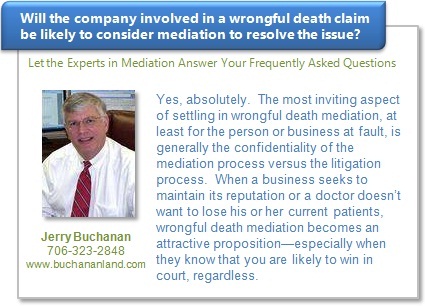 Wrongful DeathImage courtesy of Stuart Miles / FreeDigitalPhotos.net
Wrongful DeathImage courtesy of Stuart Miles / FreeDigitalPhotos.net
When a family faces a wrongful death claim, the thought of spending additional time and resources to bring it to trial can end up being as heartbreaking as the claim. After all—when you’ve already lost a loved one or significant other due to the fault of another person, it’s hard to put your trust in a judge and jury to make the situation more tolerable. Beyond that, even if an award is given in your favor, the loss of a loved one isn’t something that can be easily compensated, especially if the compensation only comes at the end of a lengthy and expensive court battle.
That’s why mediation to resolve wrongful death claims is such a powerful tool in helping families cope with their loss without spending their life savings to do it. In many cases involving wrongful death, the person or entity at fault knows that the fault will be theirs when the case is litigated, so offering to settle out of court is an attractive proposition. Whether it is a wrongful death that is a result of medical malpractice, an automobile crash, a workplace accident, product liability or faulty construction, there are damages that you can pursue through wrongful death mediation that might put you in a better position than litigation ever could.
The most inviting aspect of settling in wrongful death mediation, at least for the person or business at fault, is generally the confidentiality of the mediation process versus the litigation process. When a business seeks to maintain its reputation or a doctor doesn’t want to lose his or her current patients, wrongful death mediation becomes an attractive proposition.
In wrongful death mediation, your case will be heard by a neutral, third-party mediator who understands the laws relating to wrongful death and will be able to look at the evidence presented by both sides before suggesting a resolution to the dispute.








